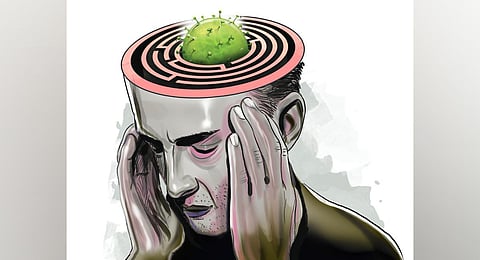

HYDERABAD: This year, the theme for World Mental Health Day (October 10), focuses on making mental health a universal human right. We speak with psychologists about measures that can be taken to make mental health accessible to all.
The right intervention made at the right time can save a life. Vijaya Dhulipud from Praan Wellness shares a real story to exemplify the same: “A call was received on the distress helpline. The caller, a third-year student from Delhi, expressed profound feelings of loneliness and isolation. He mentioned that he only attends college for exams and has lost contact with his school friends. Additionally, he shared that he lost his father at a very young age and has no siblings.
The caller specifically talked about a girl, whom he was comfortable talking with but now appears distant and irritated during their conversations, and has stopped responding to his calls, which was causing him anxiety and loneliness at that moment. In response, the volunteer provided him with a listening ear and a safe space to vent. She immediately made him practice the diaphragmatic breathing technique to calm his anxiety and asked him to practice the technique as often as possible, she also introduced him to journaling his thoughts and feelings. Since the caller mentioned loneliness and feeling isolated, she suggested breathing techniques and later encouraged him to play cricket and join a team. After three days he made a follow-up call and said he was practicing the breathing technique and journaling which has really helped him.”
It is not just these interventions that need to be at the forefront of mental healthcare but also easy accessibility and approachability of professionals at the required times. With increasing cases of suicide, anxiety and depression, it is important that mental health be seen as a universal right. “Mental health can be made accessible by integrating it with the primary healthcare sector, which means that it is ensured that the population as a whole, has access to mental health that is required for early intervention.
Secondly, primary healthcare not being associated with any specific diseases or health conditions, minimises the fear of stigmatisation. Apart from that, it needs to be ensured that mental healthcare professionals are there in all institutions, whether educational ones or at workplaces because stress can affect anyone, no matter what age or gender,” said Dr Shiwani Kohli, Clinical Psychologist at Shenoy and Chetana Hospitals.
“There are different types of stress depending on the age and occupation of the person, so individualised care is required,” she added. According to Dr Kohli, approaching a mental healthcare professional should be as normal as going to a dermatologist or a heart specialist.
In order to make mental healthcare accessible to marginalised communities and those from economically weaker sections, Dhulipud says, “I believe that a multi-pronged approach is the key. First, ensure community outreach. Establish local mental health centres in underserved areas, staffed by culturally competent professionals who understand the unique challenges faced by these communities. Secondly, develop accessible and affordable tele-therapy platforms, enabling those without regular contact with therapists to receive essential support.
Third, launch mental health awareness campaigns to destigmatise seeking help, and provide resources in multiple languages. Fourth, create subsidies or sliding-scale fees for therapy services, making them affordable for all income levels. Lastly, foster community peer support groups to provide a sense of belonging and understanding. By implementing these measures, we can ensure that no one is left behind in seeking mental well-being creating a society where mental healthcare is truly accessible for all.”
Tool Kit for immediate self-interventions